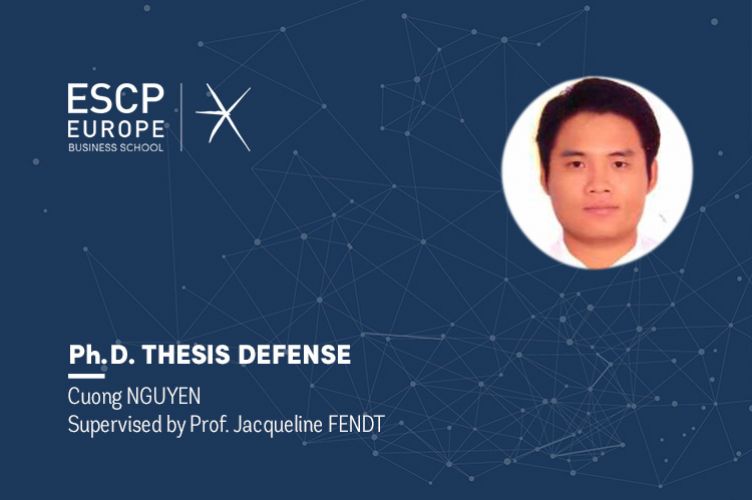19 June 2019
ESCP – Campus République
 Cuong NGUYEN, PhD candidate in the PhD programme ESCP, publicly defended his PhD thesis in Management Sciences.
Cuong NGUYEN, PhD candidate in the PhD programme ESCP, publicly defended his PhD thesis in Management Sciences.Three essays on antecedents and determinants of entrepreneurial intention among business graduates in Vietnam: toward an integrated theory
Jury
Supervisor:
- Prof. Jacqueline FENDT,
ESCP
Referees:
- Prof. Lan Huong BUI THI,
Centre Franco Vietnamien de Gestion - Prof. Nada ENDRISSAT,
Bern University of Applied Sciences
Suffragants:
- Prof. Jean-Pierre HELFER,
Université Paris 1 Panthéon-Sorbonne, IAE de Paris - Prof. Sébastien POINT,
Université de Strasbourg
Abstract
This thesis includes three essays which apply a sequential mixed-methods approach. The structure of this thesis includes a loop of quantitative analysis for three essays and a loop of qualitative analysis for the last essay.
The first essay consists of two parts: part I-A and part I-B. Part I-A essay investigates the entrepreneurial intention among business students in Vietnam by applying the theory of planned behaviour (TPB) (Ajzen, 1991). Part I-B essay investigates the entrepreneurial intention among international business students in Vietnamese business context as the country becomes a member of The Trans-Pacific Partnership (TPP) and now it is so-called the Comprehensive and Progressive Agreement for Trans-Pacific Partnership (CPTPP).
The second essay investigates the impact of demographic factors, prior exposure to self-employment and family background on the entrepreneurial intention of Vietnamese business students.
The third essay is a qualitative study of factors that influence entrepreneurial intentions among business students and small business owners. In summary, recommendations for entrepreneurial policy makers and entrepreneurial educators are discussed.
Campuses
